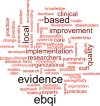Evidence-Based Quality Improvement: a Scoping Review of the Literature
- PMID: 36175760
- PMCID: PMC9708973
- DOI: 10.1007/s11606-022-07602-5
Evidence-Based Quality Improvement: a Scoping Review of the Literature
Abstract
Background: Quality improvement (QI) initiatives often reflect approaches based on anecdotal evidence, but it is unclear how initiatives can best incorporate scientific literature and methods into the QI process. Review of studies of QI initiatives that aim to systematically incorporate evidence review (termed evidence-based quality improvement (EBQI)) may provide a basis for further methodological development.
Methods: In this scoping review (registration: https://osf.io/hr5bj ) of EBQI, we searched the databases PubMed, CINAHL, and SCOPUS. The review addressed three central questions: How is EBQI defined? How is evidence used to inform evidence-informed QI initiatives? What is the effectiveness of EBQI?
Results: We identified 211 publications meeting inclusion criteria. In total, 170 publications explicitly used the term "EBQI." Published definitions emphasized relying on evidence throughout the QI process. We reviewed a subset of 67 evaluations of QI initiatives in primary care, including both studies that used the term "EBQI" with those that described an evidence-based initiative without using EBQI terminology. The most frequently reported EBQI components included use of evidence to identify previously tested effective QI interventions; engaging stakeholders; iterative intervention development; partnering with frontline clinicians; and data-driven evaluation of the QI intervention. Effectiveness estimates were positive but varied in size in ten studies that provided data on patient health outcomes.
Conclusions: EBQI is a promising strategy for integrating relevant prior scientific findings and methods systematically in the QI process, from the initial developmental phase of the IQ initiative through to its evaluation. Future QI researchers and practitioners can use these findings as the basis for further development of QI initiatives.
Keywords: evidence-based; quality improvement; scoping review.
© 2022. The Author(s).
Conflict of interest statement
The authors declare that they do not have a conflict of interest.
Figures
Similar articles
-
Ethics of Procuring and Using Organs or Tissue from Infants and Newborns for Transplantation, Research, or Commercial Purposes: Protocol for a Bioethics Scoping Review.Wellcome Open Res. 2024 Dec 5;9:717. doi: 10.12688/wellcomeopenres.23235.1. eCollection 2024. Wellcome Open Res. 2024. PMID: 39839977 Free PMC article.
-
Exploring conceptual and theoretical frameworks for nurse practitioner education: a scoping review protocol.JBI Database System Rev Implement Rep. 2015 Oct;13(10):146-55. doi: 10.11124/jbisrir-2015-2150. JBI Database System Rev Implement Rep. 2015. PMID: 26571290
-
Defining the optimum strategy for identifying adults and children with coeliac disease: systematic review and economic modelling.Health Technol Assess. 2022 Oct;26(44):1-310. doi: 10.3310/ZUCE8371. Health Technol Assess. 2022. PMID: 36321689 Free PMC article.
-
Interventions to improve mental health and well-being in care-experienced children and young people aged less than 25: the CHIMES systematic review.Public Health Res (Southampt). 2024 Dec;12(14):1-124. doi: 10.3310/MKYP6299. Public Health Res (Southampt). 2024. PMID: 39641478
-
Depressing time: Waiting, melancholia, and the psychoanalytic practice of care.In: Kirtsoglou E, Simpson B, editors. The Time of Anthropology: Studies of Contemporary Chronopolitics. Abingdon: Routledge; 2020. Chapter 5. In: Kirtsoglou E, Simpson B, editors. The Time of Anthropology: Studies of Contemporary Chronopolitics. Abingdon: Routledge; 2020. Chapter 5. PMID: 36137063 Free Books & Documents. Review.
Cited by
-
Advancing Our Understanding of Provider Behavior Change for Improved Health Outcomes.Glob Health Sci Pract. 2023 Nov 30;11(Suppl 1):e2300314. doi: 10.9745/GHSP-D-23-00314. Print 2023 Nov 30. Glob Health Sci Pract. 2023. PMID: 38035717 Free PMC article.
-
A Public Health Critical Race Praxis Informed Congestive Heart Failure Quality Improvement Initiative on Inpatient General Medicine.J Gen Intern Med. 2023 Aug;38(10):2236-2244. doi: 10.1007/s11606-023-08086-7. Epub 2023 Feb 27. J Gen Intern Med. 2023. PMID: 36849864 Free PMC article.
-
Quality and reporting of large-scale improvement programmes: a review of maternity initiatives in the English NHS, 2010-2023.BMJ Qual Saf. 2024 Oct 18;33(11):704-715. doi: 10.1136/bmjqs-2023-016606. BMJ Qual Saf. 2024. PMID: 38050180 Free PMC article. Review.
-
Obstetric Anal Sphincter Injury Care Bundle: A Quality Improvement Initiative.Int Urogynecol J. 2024 Nov;35(11):2125-2130. doi: 10.1007/s00192-024-05885-2. Epub 2024 Sep 27. Int Urogynecol J. 2024. PMID: 39331149 Free PMC article.
-
Multiple chemical sensitivity scoping review protocol: overview of research and MCS construct.BMJ Open. 2023 Sep 22;13(9):e072098. doi: 10.1136/bmjopen-2023-072098. BMJ Open. 2023. PMID: 37739463 Free PMC article.
References
-
- Institute for Healthcare Improvement Website http://www.ihi.org/ihi. Accessed 5/2/2022.
-
- Deming WE. Quality, Productivity and Competitive Position. Cambridge, MA: MIT Center for Advanced Engineering Studies; 1982.
-
- Nelson K, Reddy A, Stockdale SE, Rose D, Fihn S, Rosland A-M, et al., editors. The Primary Care Analytics Team: Integrating Research and Clinical Care Within the Veterans Health Administration Office of Primary Care. Healthcare; 2021: Elsevier. - PubMed
-
- Ovretveit J, Hempel S, Magnabosco JL, Mittman BS, Rubenstein LV, Ganz DA. Guidance for research-practice partnerships (R-PPs) and collaborative research. J Health Manag. 2014;28(1):115-26. 10.1108/JHOM-08-2013-0164 - PubMed
Publication types
MeSH terms
LinkOut - more resources
Full Text Sources




